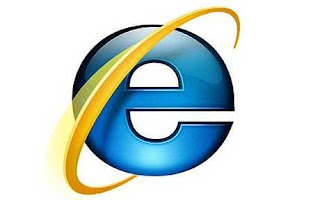Should you stop using Internet Explorer?
The recent revelation of a major security flaw in Internet Explorer makes this a good time to consider the alternatives
最近所披露在IE瀏覧器的一個主要保安漏洞,令這是一個好時機考慮代替品
By Claudine Beaumont, Technology Editor
Published: 9:00AM GMT 23 Jan 2010
 Microsoft has released a software update for Internet Explorer that will patch security flaws -- but should you switch to a different browser? 微軟已經發布了Internet Explorer的更新軟件,將會修補安全漏洞 - 但你應否轉去另一個不同的瀏覽器?
Microsoft has released a software update for Internet Explorer that will patch security flaws -- but should you switch to a different browser? 微軟已經發布了Internet Explorer的更新軟件,將會修補安全漏洞 - 但你應否轉去另一個不同的瀏覽器?It’s been a worrying week for computer users. Internet Explorer, the world’s most popular web browser, was found to have a serious security flaw that could have put millions of computer users at risk from cyber criminals and hackers.
這是一個令電腦用戶擔心的星期,世界上最流行的網頁瀏覽器IE,被發現有一個嚴重的安全漏洞,足讓數以百萬計的電腦用戶處於由網絡犯罪分子和黑客而來的風險。
The browser is thought to be the weak link that allowed hackers to carry out a sophisticated and highly targeted cyber attack against Google earlier this week, which resulted in the search giant reconsidering its operation in China.
該瀏覽器被認為是弱的連結,容許黑客在本週早些時候,進行對谷歌的複雜和高度針對性的網絡攻擊,導致這搜索巨人重新考慮其在中國的運作。
It also sent entire nations in to a spin. The governments of France and Germany warned their citizens not to use Internet Explorer, and to switch instead to a different browser. The British government declined to follow suit.
它還將整個國家陷入兜兜轉轉,法國和德國政府警告其公民不要使用IE瀏覽器,並取而代之轉換到另一個不同的瀏覽器,而英國政府拒絕效仿。
Microsoft has now released a “patch”, to plug the hole in the browser’s code and protect it against the vulnerabilities that allowed Chinese hackers to break in to the Google email accounts of dissidents and human rights activists, and compromise the security of other large corporations.
But many computer users are wondering whether they should consider using a different web browser, such as Mozilla’s Firefox or Google Chrome.
“The patch should resolve the current problems with Internet Explorer, but the big question is, will people install it?,” asks Graham Cluley, a security expert with Sophos. “Some people can be very lackadaisical about installing these software updates, but they really need to start to get in to the habit of updating their computers – companies such as Microsoft release these updates for a good reason.”
Cluley says that Internet Explorer 6 is the most vulnerable web browser, yet it is still used by big government agencies such as the Ministry of Defence. This is a hangover from the early days of the web, when IT departments wrote systems and software that was only compatible with Internet Explorer 6, making it tricky and expensive to migrate to more stable and secure versions of the browser further down the line.
“If you’re using Internet Explorer 6 at home, you should upgrade to internet Explorer 8, the latest and greatest version of the browser,” advises Cluley. “It’s also worth considering a different browser altogether. The new version of Firefox is very good at updating itself to keep web users protected. It will do a much better job of securing the whole web experience.”
Despite the global dominance of Internet Explorer – it accounts for 63 per cent of the whole browser market – there are plenty of alternatives available to computer users. One of the most popular is Firefox, which has a 25 per cent share of the browser market worldwide, but is attracting lots of new users in Europe, accounting for 40 per cent of that search market, just five per cent less than Microsoft.
Indeed, while Graham Cluley says that no web browser is completely secure, he thinks diversity in the browser market benefits everyone. “Internet Explorer is attractive to hackers and virus writers because it dominates the market,” he says.
“Encouraging a bit of variety makes it harder for hackers to impact lots of people.”
http://www.telegraph.co.uk/technology/microsoft/7054429/Should-you-stop-using-Internet-Explorer.html
微軟急補IE保安漏洞 防黑客襲擊
http://autumnson-nwo.blogspot.com/2010/01/ie.html
Internet Explorer的五個副選
Five alternatives to Internet Explorer
Here's our guide to the best alternative web browsers on the market
市場上網頁瀏覽器的最佳副選,以下是我們的指南。
By Claudine Beaumont, Technology Editor
Published: 9:00AM GMT 23 Jan 2010

There are plenty of alternatives to Internet Explorer, but be warned -- no web browser is 100 per cent secure
IE瀏覽器外有很多的選擇,但警告 - 沒有網頁瀏覽器是百分之百安全
Mozilla Firefox
Firefox 3.6 is the latest version of the increasingly popular web browser. Mozilla claims it's 20 per cent faster than its predecessor, and features a "plug-in updater" – a tool that detects out-of-date programs that run in your browser (such as Flash, which is used for displaying some animated web pages or watching online videos).
Flock
Flock is a "social web browser" – it acts as a portal for people who want to integrate their Facebook and Flickr accounts, blogs, YouTube page and favourite websites into a single window.
Chrome
Google's web browser handles media-rich websites with ease, and because it treats individual "tabs" – open web pages – as separate programs, meaning that if one tab crashes, the whole browsing session isn't affected. The "incognito window" means you visit sites without saving your browsing history.
Opera
Opera is used on the Nintendo Wii, and Opera Mini is also an incredibly popular browser for mobile phones. Opera has all the usual features (it pioneered tabbed browsing in 2000), and can restore browsing sessions at the click of a mouse.
Safari
The Apple equivalent of Internet Explorer has a similar look and feel to the iTunes music store. Along with tabbed browsing and a built-in RSS feed reader, it also has Top Sites, a window that shows your most frequently-visited web pages.
http://www.telegraph.co.uk/technology/microsoft/7054594/Five-alternatives-to-Internet-Explorer.html
沒有留言:
發佈留言